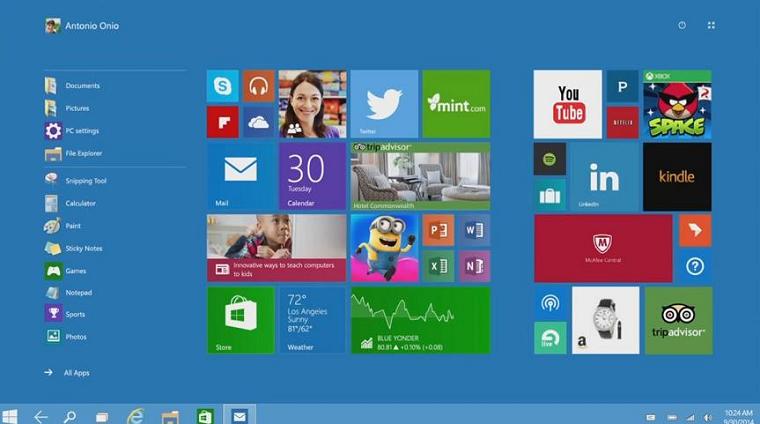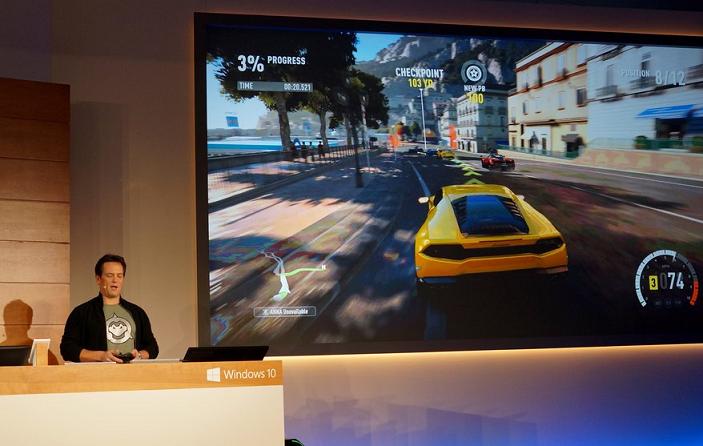Yesterday at an event, tech giant Microsoft ‘opened its windows’ revealing its latest operating system Windows 10 which comes out to the users who have previously signed up for the pre-release copies. As expected, Microsoft has integrated Windows across all the platforms which include desktop, mobile, tablet and different platforms. The event not only introduced Windows 10 but also showed the futuristic technology Microsoft was working upon. The HoloLens, an augmented reality headset and the Windows Holographic software it has built to support the headset, apart from the 84 inch touchscreen tablet were some of the gadgets that took everyone by surprise. AnimationXpress.com brings some of the great technology that’s on offer to the forefront.

1. The start button is back
The start button that everyone was missing and was absent from the Windows 8, has come back in Windows 10. The start menu will have a new Action Center which will be similar to Android’s Settings Menu and provide quick access to Wi-Fi options, Bluetooth and other settings – and the settings menus themselves should be cleaned up and easier to use. Microsoft is leaving no stone unturned to keep the best features of desktop Windows while adapting to touchscreens and providing the best experience on both the platforms. A new feature called Continuum, in fact, is designed specifically for convertible devices, switching almost instantly from a mouse and keyboard to a tablet screen.
2. Cortana makes desktop debut
Microsoft’s personal digital assistant, Cortana will make its desktop debut in Windows 10 after being available only for Windows phones. It will lie beside the start button and will serve as the natural-language interface for Windows 10. Queries can be spoken or typed and the searches can be across the web and even on the OneDrives. Cortana will also be integrated into the new Maps app, reminding people where they’ve parked their car. Cortana will also be proactive, popping up notifications it thinks one will be interested in — tracking flights, stocks, sports, and other it’s either learned or one entered manually into its notebook.
3. Windows 10 is Free
Microsoft has revealed that 1.7 million beta testers have been signed up for the pre-release copies of Windows 10 and these users will help iron out the bugs from the operating system before the big release. Also, with the announcement came good news for the users who want to update to Windows 10 immediately after the release. Windows 10 will be free to update for Windows 7 or 8.1 users on PCs, laptops or even phones with Windows 8.1. But the offer will only be valid for one year.

4. Good News for Gamers
Microsoft has also been active to serve to the gamer community and has revealed that it will create a cross service social network on Windows 10 which will have users from Xbox and services from PC like Steam. Also, game streaming on Windows 10 will be the real deal and you can stream your games on Windows phones and tablets from anywhere as long as you are in the same network.
5. Spartan is for Real
The rumours of the new browser for Windows 10 titled Spartan have been doing rounds since the last week and the rumours have come out to be true. Spartan, a new browser built from the ground up for speed will have Cortana collaboration and simplicity which its predecessor lacked.
6. Windows Office Suite Apps for free
Office Suites have long been the front runners in the mobile phone segment and Microsoft too wants to tap into this segment as it is one of the originators of the Office tools. Windows 10 will have Word, Excel and PowerPoint for free.
7. Microsoft enters VR world with HoloLens
One of the biggest surprises of the Microsoft event was HoloLens, an augmented headset that brings virtual world to life literally. Supporting the headset is software Windows Holographic which brings impossible to imagine ideas on your tabletop or a wall across you. It’s an independent unit and does not require an add-on computer or mobile device attached to it like Oculus or Gear VR.
In the demos Microsoft showed off on stage, a user was able to use HoloLens and Windows Holographic to create a 3D model of a drone. That model could then be sent to a 3D printer for actual production.
HoloLens and Windows Holographic work not just with voice but with gestures – a la Microsoft Kinect – makes the entire concept more malleable and seem more futuristic.
8. And also, 84 inch super tablet
Called the Microsoft Surface Hub, the 84-inch 4K display is for the workplace. It can be mounted on the wall and used as a visualisation tool during meetings and brainstorming sessions.
The Surface Hub comes with a whole collection of built in sensors, cameras, NFC and microphones – and it requires just one cable to get started. From the welcome screen, users can call or connect a personal device to get content on the screen. By picking up an accompanying pen, a white board will automatically appear and allow you to write directly on screen. It will also have Skype for Business.
Microsoft is not only gearing for the present but also pushing the envelope for the future as to how one will interact in the digital space. Time will only tell if these upcoming changes are game-changers or deal-breakers for the company.
